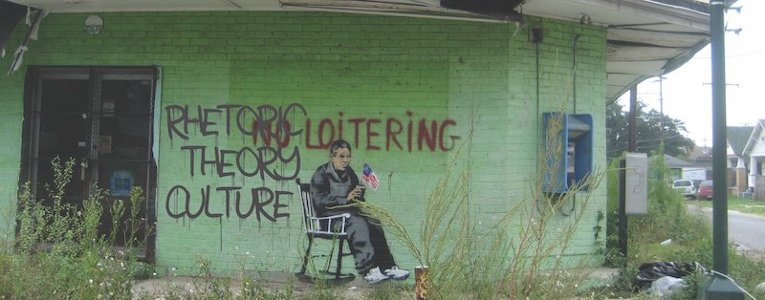Effective Fall 2022
The Rhetoric, Theory, and Culture (RTC) curriculum consists of courses providing general instruction in scholarly work and pedagogy as well as two types of content courses:
- Groundwork courses providing an intensive study of a topic in one of the five interdisciplinary areas
- Focus courses providing advanced and specialized topics of study.
Introduction to Graduate Studies and Practica
Introduction to Graduate Studies
Taken in the student’s first year, meeting once every two weeks
- Introduces students to the structure, processes, and timelines of the RTC program and to expectations and skills for graduate-level inquiry
- Introduces graduate faculty and their scholarly specializations
- Surveys methodologies/methods for interdisciplinary humanistic inquiry
- Assists students to identify a focus of interest, generate research ideas, and articulate a defensible research question
Composition Practicum (HU 5931)
3 credits in a student's first semester
This course is designed for GTIs teaching UN 1015 - Composition for the first time. Weekly readings and assignments, as well as ongoing mentorship and consultation are designed to support continuous improvement as a writing teacher/scholar.
Other Practica
Available in Technical Communication, Modern Language Pedagogy, Communication (by consent of instructor)
These pedagogy courses are offered as needed in order to prepare graduate students for teaching a variety of courses other than the Composition course. Practica may be dedicated to teaching courses in Technical Communication, Modern Languages, Communication, or other subjects.
Sample Practica Contents:
- Read current research on best pedagogical practices within a specific academic field
- Observe undergraduate teaching by faculty and advanced graduate students
- Design syllabi and assignments
- Attend courses taught by graduate peers and reflect on practices
- Participate in group grade norming
Coursework
Groundwork:
The RTC program is centered on coursework organized within five clusters, with two courses per cluster. PhD students are required to take four groundwork courses, and MS students are required to take three.
Writing, Literacy, and Technical Communication
Philosophy and Rhetoric
Technology, Media, and Visual Studies
Language, Literature, and Globalization
Communication and Culture
Focus:
Focus courses provide an opportunity to develop an in-depth understanding of a specific topic, issue, or area of scholarly inquiry. Focus course topics include:
- Feminist Philosophy
- Cyberactivism and Social Change
- The Body in Visual Representation
- Community Literacy
- Feminist Critiques of Technology and Science
- Critical Aesthetics from Analog to Digital Color
- Media Power
- Cultural Industries, Popular Culture, and Celebrity
Additional Coursework and Requirements
Supplementary Coursework Options
- 4000-level courses: MS and PhD students are limited to taking one 4000-level course, with the stipulation that they consult with the course’s professor on appropriate additional readings/papers, etc. This must be approved by the RTC Director, in consultation with the student’s advisor.
- Coursework outside RTC: All coursework outside the RTC program must be approved by the RTC Director, in consultation with the student’s advisor.
Students may apply a maximum of three (3) supplementary coursework credits (4000-level courses, coursework outside RTC, independent study) toward the coursework requirements for their degree. Students with compelling reasons to add further supplementary coursework credits (i.e., these would provide necessary important background preparation for the student’s research) may petition the RTC director for a waiver.
Responsible Conduct of Research
The Graduate School requires all graduate students to complete two Responsible Conduct of Research (RCR) courses. The Basic course is offered during the new graduate student orientation prior to the start of classes each semester. The course is also offered online. The Advanced RCR requirement can be fulfilled by taking one of the courses offered by various departments. (All are 1 or 2 credits. There are also 3-credit courses that have been authorized as Advanced RCR courses. The department offers a Research Integrity Workshop each summer that fulfills this requirement.
Annual Student Progress Evaluation Form
The annual Student Progress Evaluation Form verifies that students are making timely progress toward degree completion and provides students with feedback concerning degree progress from their advisor and from the program. This form does not record an evaluation of a student’s academic performance. Continued funding and/or enrollment in the RTC program is based on satisfactory progress. This form ensures that students are informed of any concerns that might affect the department’s assessment of their progress and that they are given ample opportunity to remedy those concerns.
Requirements by Degree
Master's students take 2 years of coursework. Options for the fourth semester include more coursework, a project, or a thesis.
PhD students also take 2 years of coursework. Third and fourth year requirements involve qualifying exams, dissertation research, dissertation writing, and job search.
